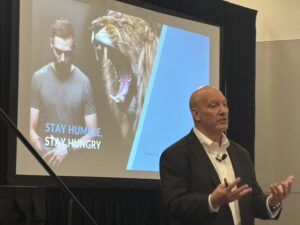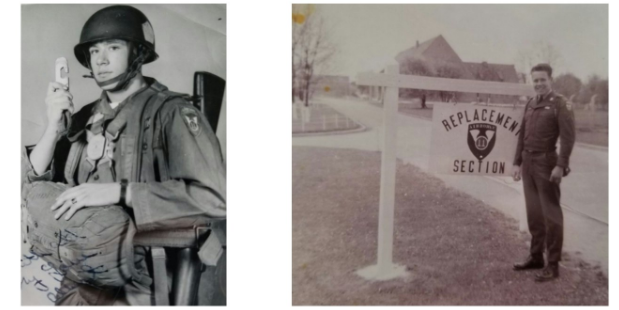
Mike Anderson shares why quality collision repairs are important to him
By onAnnouncements
During an Army Airborne mission in Vietnam, Mike Anderson’s father, Andy Anderson, jumped out of a plane to find that his parachute wouldn’t open.
He tried his emergency parachute. It wouldn’t open either.
Anderson’s father fell through the sky with a “Mae West” parachute malfunction, ultimately landing with full force on his ankle.
It changed the trajectory of his father’s life, and eventually motivated Anderson’s.
Anderson told a Southeast Collision Conference crowd on May 2 that his father’s story is the reason behind his passion for safe and proper repairs.
He also told the crowd that he may have lost focus in recent years as his job shifted from the shop floor to a consulting position.
“I started to get comfortable and have some successes in my career where people want to hear me speak,” Anderson said. “I will tell you, I started to find myself more conservative, being politically correct and playing it safe, and not offending people.”
A friend reached out, Anderson said. He added that the friend noted he’d seen a change in Anderson from someone vocal to someone who only said something when it was convenient or safe.
“That person helped me to find my mojo and realize I need to get back involved and I need to start taking a stand again, which is why I personally said I’m going to make a commitment start showing up at CIC, and I’m going to make a commitment to start standing up at the microphone,” Anderson said. “I’m going to make sure that I’m going to start getting outside my comfort zone, and I’m going to call people out if I don’t agree with what they’re doing.”
Anderson had to look back at his “why,” his father’s story.
“I will not apologize anymore for the convictions I have for safe and proper repairs and for shops to do the right thing,” he said.
Anderson said his father was raised in Virginia and was one of nine kids. The family had limited resources, so at 16 years old, his father forged his birth certificate to join the military and send money back to his family.
After the parachute malfunction, Andy Anderson spent two years recovering at Walter Reed Hospital. His leg was partially paralyzed.
“He was limited in his physical activities,” Anderson said. “He couldn’t play ball with me because he couldn’t run. He couldn’t go snow skiing.”
But it was never used as an excuse for not accomplishing something in life, Anderson said.
“Even though his leg was paralyzed from the left knee down and even though he walked with a limp, my Dad gets out of Walter Reed Hospital after two years, and he didn’t want to go back to his hometown,” Anderson said. “He decides he’s going to go to work in a body shop and learn to do body work, and my Dad did.”
The military investigated Andy Anderson’s parachute after the incident.
“There’s somebody that’s called a parachute rigger, which is someone that takes your parachute after you jump, and they lay it on a long table, and they inspect every single thread, and inspect every single part of the parachute to see if there’s anything wrong with it that would cause it to not deploy again in the future,” Anderson said. “What they found out is my Dad’s parachute did not deploy, and the reason his emergency chute did not deploy is because someone did not pack his parachute properly.
“My Dad’s life was forever impacted, and there were things he was unable to do because someone did not pack his parachute properly. My Dad instilled in me and said, ‘Son, whenever we fix a car, we are packing that person’s parachute. Every time we fix a car, we are packing their parachute. So when you weld on it, or you repair a structural component, or you apply corrosion protection, whatever you do, you are packing their parachute.’”
Anderson said he is reclaiming his “why.”
“Have I educated people?” Anderson said. “Yes, I’m not going to deny that, but do I think I could have been more outspoken? Yes, and that’s my goal today is to reclaim that while I’m here with you, because my ‘why’ is my Dad’s story. If you’re here today and you fix someone’s car, you are packing their parachute. You’re giving them their keys back. You’re saying, ‘Your parachute will deploy like it’s supposed to next time you jump out of an airplane with a parachute — when you wreck your car.’ That’s what we’re saying. We should never apologize for doing the right thing.”
Encouragement to be outspoken on industry issues was also discussed the day before Anderson’s presentation during the latest Collision Industry Conference (CIC) meeting.
During the Collision Industry Conference (CIC) held a day before Anderson’s presentation, Society of Collision Repair Specialists Executive Director Aaron Schulenburg, who also serves as chairman of a segment of the conference branded as “the CIC Industry Experiment”, discussed how the committee could be used in the future to discuss complex issues facing the industry in a new way.
The new segment comes out of what was formerly the Industry Relations Committee, whose mission was previously to foster discussions that identify topics the industry would benefit from gaining alignment on, he said.
At the time of development, the committee’s mission was to foster discussions that identify topics the industry would benefit from gaining alignment on, he said.
“I think when you look at an event that’s made up of a lot of different industry segments and participants and you look at how committees function, sometimes the goal of gaining alignment gets in the way of talking about the things that need to be talked about,” Schulenburg said. “It gets in the way of really sharing perspectives or deep diving in, because the goal of alignment is different from the goal expressing the challenge, and sometimes you have to better understand the challenges to figure out how to fix them.”
Schulenburg said information-sharing has changed over time. Media programs, such as “60 Minutes,” aren’t as popular with younger generations. Podcasts like “The Joe Rogan Experience” have captured younger audiences, he said.
He noted that Rogan attracts serious guests and talks about important issues without some of the guardrails that are necessary in traditional media settings.
“The conversation is more casual, despite the fact that the topics are still very serious and talking about real issues,” Schulenburg said.
The committee could set up casual conversations on serious issues with people of importance to the topics at future CIC meetings, he said.
“Could you have a format that was less of a typical panel where you go down the line and ask for input, and more? Where you bring in a guest and ask them to deep dive, ask them to give their perspective? What stops a committee from having a conversation that just looks different from what we’re used to today? If for no other reason than to break up the day a little bit, to have a different approach, to maybe think about a topic from somebody else’s viewpoint,” he said.
Schulenburg said the goal is to get the audience thinking differently and to relate to the perspective given. He said the speakers could have very strong opinions relevant to the industry and would have a full 40 minutes to work through that topic and be challenged.
“The mission is to deliver an in-person program that encourages thought-provoking, candid conversations on timely topics that confront burning issues in the industry and explore sometimes uncomfortable truths or perceptions,” Schulenburg said. “I think that’s really an elaboration on what the vision of CIC was from day one. The committee’s purpose is to explore industry behaviors, beliefs, feelings, and relationships.
“Let’s not debate the issues in the committee,” Schulenburg said. “Let’s be unicorn hunters. The committee can serve as a talent agency. The talent agency’s responsibility is to go, ‘Who’s the one person who’s got a really strong opinion who can make for an engaging dialogue up here on the stage?’”
IMAGES
Mike Anderson speaks at the Southeast Collision Conference on May 2, 2025/Teresa Moss. Embedded photos courtesy of Mike Anderson

